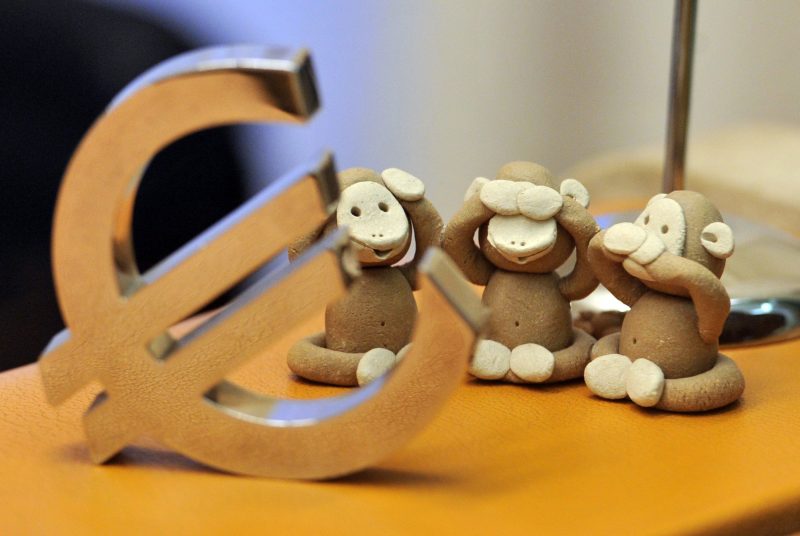EU leaders sideline euro divisions at summit on future
EU leaders say the euro needs reform, but they’re likely to kick the can down the road once more (GEORGES GOBET)
Sibiu (Romania) (AFP) – EU leaders meeting in a mountainous city in Romania on Thursday will discuss the future of Europe, but the fate of the euro will be mostly ignored.
Launching the single currency is probably the EU’s most ambitious achievement yet, two decades later, it is little-loved and the 19 countries that use it are split, mostly between richer and poorer members.
Against this backdrop, the euro will only be referred to in passing at a Sibiu summit that was originally intended as a renewal of vows by the remaining 27 member states after a now-delayed Brexit.
“There is a lot of unfinished business, which we haven’t addressed and I very much doubt that Sibiu will get us much further forward,” said Fabian Zuleeg, head of European Policy Centre in Brussels.
The euro is widely acknowledged to be imperfect and in need of reform to unify what are vastly disparate economies, even more so after the eurozone debt crisis.
But reform, when it does happen, has so far come only in an emergency when there is no choice but to bridge divisions.
“The objective of Sibiu is not to really discuss the issues, but rather to show unity by focusing on consensual themes,” a European source protested.
– ‘No libido’ –
The idea for the Sibiu summit came largely from European Commission chief Jean-Claude Juncker, who as a former Luxembourg prime minister has a long history in the story of the euro.
Ahead of Sibiu, an angry Juncker blamed inaction and the lack of ambition in the eurozone for the distrust of the richer nations towards their poorer partners.
“There is no progress with the deepening of the monetary union because the Netherlands, Austria and all too often Germany stand in the way,” Juncker told Handelsblatt newspaper ahead of the summit.
“We don’t love each other. We have lost our collective libido,” he said.
Downplaying issues with the euro will be especially frustrating for French President Emmanuel Macron who came to office in 2017 with a master plan to better integrate the single currency union.
This included the creation of a eurozone budget as well as a dedicated finance minister — both ideas that have either been watered down or scrapped entirely.
Juncker also had his own big plans for the eurozone, different from Macron’s but also intended to surf on an improving economy.
“It’s pretty clear that if you look back a year ago… a lot us saw an alignment of stars for moving the single currency forward,” Nicolas Veron of the Brussels-based Bruegel think tank told AFP.
“Obviously this hasn’t happened… It is clear that they won’t achieve anything meaningful anytime soon and that’s perhaps a bit depressing,” he said.
– ‘Bitter reality’ –
Dreams of an overhaul were fast frustrated, with the Netherlands leading a band of smaller EU nations — sometimes known as the Hanseatic league — against France and its southern backers.
“The bitter reality is that we have a Union in which part of the population, mainly in northwestern Europe, wants to leave,” Dutch Finance Minister Wopke Hoekstra said on Tuesday, summing up the concerns of the richer north.
The Dutch resistance has been hugely successful, reducing the eurozone budget idea to a symbolic afterthought and delaying indefinitely a Europe-wide deposit insurance scheme.
A senior diplomat insisted that the Dutch and their allies — with powerful Germany quietly looking on — were not intolerant to change.
“There is a broad agreement that we need much more than what exists today, the disagreement is on which way and how,” the diplomat said.
Some observers believe that change is happening but out of the limelight, with hot topics such as Brexit, migration and climate change hogging the headlines.
A top French official said President Macron was also learning from his mistakes and now reaching out to smaller countries and not just Germany in order bring change.
France has always had a trouble looking beyond Germany when addressing big shifts. Both countries make up half of the eurozone’s GDP.
“That’s wrong and has cost us a loss of influence. Changing things will come but will take some time,” the top French official added.
And nobody expects it to happen at Sibiu.
Disclaimer: Validity of the above story is for 7 Days from original date of publishing. Source: AFP.


